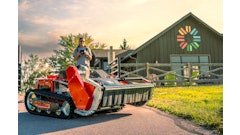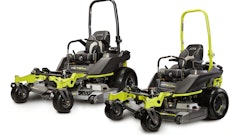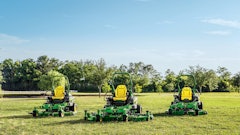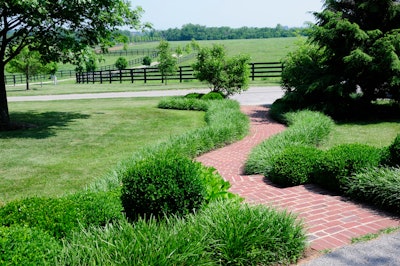
Every year, 20 horses bolt out of the paddocks at the Kentucky Derby, vying for the coveted rose garland. And every year, at least a third of those horses have one thing in common: they all grazed and galloped on grass maintained by Hillenmeyer Landscape Services.
“In any given year, up to half of the Derby horses have some connection with a farm we are associated with or take care of,” said Chase Hillenmeyer, president Hillenmeyer Landscape Services. “We’ve had a few winners on farms we’ve maintained.”
The sixth-generation family commercial landscaping operation began in 1841 as a fruit tree retail business in Lexington, Kentucky. Around the 1980s, the company’s focus shifted to landscape and commercial lawncare maintenance. And in the 90’s, Hillenmeyer received its first contract for equine maintenance. “That’s the biggest thing we do today,” Hillenmeyer said. “Our niche is maintaining horse farms in central Kentucky.”
With properties ranging from 400 acres all the way up to a sprawling 2,500 acres, equine maintenance is a constant job in peak season. Hillenmeyer and his crew of 275 provide two types of mowing services for horse farms: common mowing, which is conventional grass cutting with a 60-inch ZTR mower around houses, barns and roadways; and field mowing, accomplished with a tractor and a 20-foot batwing application for mowing fields and paddocks. They also string trim fence lines, with one contract boasting 85-miles of fencing, and offer services such as mulching, edging and tree trimming.
Keeping up in Kentucky
As you can imagine, keeping the fields of central Kentucky’s horse farms maintained takes quite a few lawnmowers. The Hillenmeyer fleet runs at a little more than 100 units, but in the past few years, the crew started to encounter problems with its engine manufacturer.
“We were seeing a large number of engines blowing prematurely in the 1,000 to 1,500-hour range,” said Hillenmeyer, “This caused us significant production problems, management problems and customer problems.”
On top of the performance issues, Hillenmeyer experienced a lack of accountability on the engine manufacturer’s part, as well as the mower manufacturer that spec’d the engines.
“You can have product failure, but you can’t have service failure — they had both,” he said. So, they decided to make a change.
In the past, Hillenmeyer had purchased some units spec’d with Vanguard engines. “We looked at our fleet and saw that the engines with a Vanguard sticker on them lasted a lot longer than the ones without Vanguard stickers,” Hillenmeyer said.
With that in mind and looking for alignment among his engine and mower manufacturer, Hillenmeyer and his team reached out to Briggs & Stratton to see what it could offer.
Finding Harmony
Hillenmeyer quickly discovered that not only did Vanguard engines offer the performance he was looking for, but an opportunity to work with several manufacturers that already worked in harmony with one another.
“The chain of alignment among the Ferris mowers and Vanguard engine teams and our local distributor really caught our attention,” he said. “When we spoke with them, they heard our challenges with previous manufacturers who didn’t work well together and showed us how that wouldn’t be a problem if we went with Vanguard engines.”
A factory tour of the engine manufacturing facility in Auburn, Alabama, solidified that promise. “We were blown away by watching the Vanguard production team, and the quality controls they used. It gave us a lot of confidence,” he said.
The final selling point for Hillenmeyer came down to maintenance. The BIG BLOCK V-Twin engine line he was eyeing to spec on the new Ferris mowers came equipped with Vanguard’s innovative Oil Guard system.
“We saw that Oil Guard would help us reduce our time spent on oil maintenance and therefore maintenance cost,” said Hillenmeyer, “Not to mention the larger oil reservoir that offers a little more margin of error on an engine blowing.”
Taking all these factors into account, Hillenmeyer and his team went ahead and replaced 35 units — about a third of its fleet — with Ferris mowers equipped with Vanguard engines.
A New Season
The new engines tackled the 2017-18 season with ease.
“There was a period of time with our previous manufacturer when we were constantly dealing with down equipment, retooling crews, and working with two half crews instead of a whole crew because mowers weren’t working,” said Hillenmeyer. The crew wasn’t able to complete jobs on time, and everyone was feeling the burden of unreliable equipment.
With the Vanguard engines running the show this past season, reliability was never in question.
“If the mowers aren’t working, that causes pain all the way down the line. Uptime is key, and the Vanguard engines have certainly provided that,” said Hillenmeyer.
Now, the Hillenmeyer crew can get back to what it’s been doing for generations: providing professional landscaping services to central Kentucky. And while it can’t be known if its grass cutting has anything to do with determining the winners at the Kentucky Derby,
Hillenmeyer has a theory. “Let’s just say that we do our job so well that the owners can focus that much more attention on the horses.”



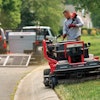
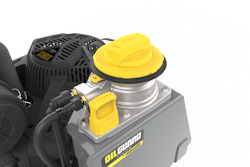
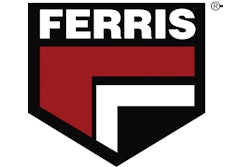
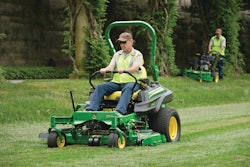
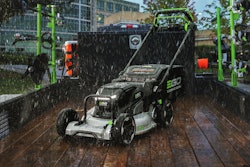
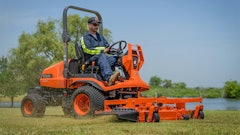







![Gravely Pro Turn Mach One My23 Dsc03139 Edit 1200x800 5b2df79[1]](https://img.greenindustrypros.com/mindful/acbm/workspaces/default/uploads/2025/10/gravely-pro-turn-mach-one-my23-dsc03139-edit-1200x800-5b2df791.BucBnDoN22.jpg?ar=16%3A9&auto=format%2Ccompress&fit=crop&h=135&q=70&w=240)
